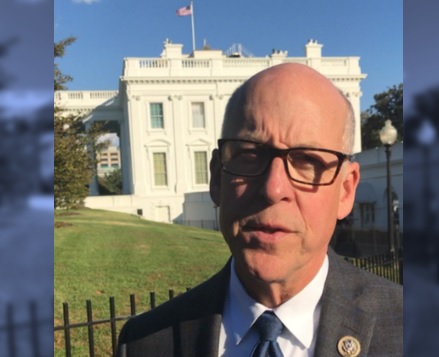Representative Greg Walden (R-Hood River) attended a ceremony at the White House for the signing of a landmark water package that includes drought relief for farmers in the Klamath Basin. Walden secured a key provision in the America’s Water Infrastructure Act, which President Trump signed into law today, that authorizes $10 million annually for four years to the Bureau of Reclamation (BOR) to implement needed drought relief measures for the agriculture community in the Klamath Basin.
“This is good news for farmers, ranchers, and water users in the Klamath Basin who are just getting through another challenging water year,” said Walden. “Authorizing $10 million annually for four years to the Bureau of Reclamation will assist with groundwater pumping and other drought relief measures for basin farmers that we secured in law earlier this year. This will ensure needed relief makes it to irrigators who suffered added costs and losses this water year, and will help ensure we are prepared if our farmers are hit again in a future drought year. I am proud to have worked with my Oregon colleagues to secure this provision in the larger legislation, and applaud the Trump Administration for prioritizing this needed relief for farmers in the Klamath basin.
The provisions Walden worked with his colleagues to include in the America’s Water Infrastructure Act will provide direction to BOR on how the agency is to spend the funds acquired earlier this year and any that are appropriated in succeeding years. This will give BOR the authority to spend $10 million each year over the next four years to implement measures such as:
- Groundwater pumping to increase the flexibility, reliability, and efficient use of water in the Klamath Basin;
- Temporary and voluntary land idling on Bureau of Reclamation property to make additional water available; and,
- Facilitating the movement of non-Project water through Bureau of Reclamation facilities to assist irrigators.
Representative Walden also included provisions in the America’s Water Infrastructure Act related to hydropower development and safe drinking water.
“Importantly, this legislation also includes measures to boost hydropower development in Oregon and modernize our drinking water infrastructure so communities have safe water to drink when they turn on the faucet,” said Walden. “Each of these issues have been priorities for me in Congress and I am pleased to see that they were included in this landmark water package.”
Promoting Hydropower
This package combines several bills from Walden’s Energy and Commerce Committee that passed the House including, H.R. 2880, the Promoting Closed-Loop Pumped Storage Hydropower Act; H.R. 2872, the Promoting Hydropower Development at Existing Nonpowered Dams Act; H.R. 2786, To Amend the Federal Power Act with Respect to the Criteria and Process to Qualify as a Qualifying Conduit Hydropower Facility; as well as key provisions from H.R. 3043, the Hydropower Policy Modernization Act. These bills:
Encourage the use of clean, baseload hydropower by streamlining the regulatory permitting process.
Get new hydropower projects to market faster, saving time and money.
Remove barriers to investments in hydropower, which create jobs and provide low-cost, emissions-free electricity to consumers.
Modernizing Our Drinking Water Infrastructure
This package incorporates substantial portions of H.R. 3387, the Drinking Water System Improvement Act, which passed the Energy and Commerce Committee unanimously in July 2017. This bill authorizes more than $4.4 billion over three years for the Drinking Water State Revolving Loan Fund program.
The Drinking Water State Revolving Fund (DWSRF) helps local communities provide their residents with safe drinking water, comply with drinking water rules and improve infrastructure. For example, in Malheur County, the city of Vale used the DWSRF to complete a new 750,000 gallon water storage tank and $8 million water treatment facility to increase the city’s water supply. Nyssa also used the fund for a similar project. Meanwhile, in Umatilla County, the city of Pendleton secured funding through the DWSRF to replace 33 miles of pipe nearing a century in age.
Other key provisions to improve safe drinking water include:
- Improving accountability by aiding states and utilities with compliance and asset management.
- Protecting communities by updating anti-terrorism and resilience measures at public water systems.
- Enhancing transparency for consumers about the quality of their drinking water.
- Authorization of $100 million over the next two fiscal years for areas affected by natural disasters that need help repairing their drinking water systems or hooking up to other ones to obtain potable drinking water.
Click here to learn more about the America’s Water Infrastructure Act of 2018.
Disclaimer: Articles featured on Oregon Report are the creation, responsibility and opinion of the authoring individual or organization which is featured at the top of every article.


